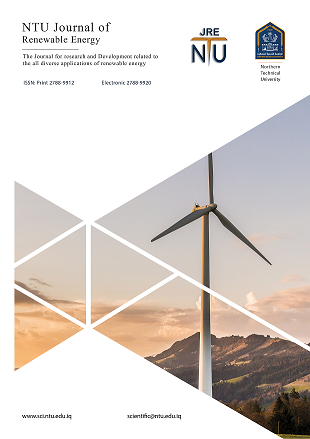Investigating the Impact of Internal and External Factors on Solar Cell Performance to Enhance Energy Conversion Efficiency
DOI:
https://doi.org/10.56286/x12hd434Keywords:
open circuit voltage (VO.C), short circuit current (IS.C), Voltage at maximum power point (Vmpp), Current at maximum power point (Impp), power at maximum power point (Pmpp), fill factor (FF), solar cell efficiency (?)Abstract
Solar energy has become a promising renewable energy source due to rising worldwide energy demand and environmental concerns in recent decades. This study examines temperature, solar irradiance, and series resistance (Rs) as internal and external elements affecting solar panel efficiency to optimise photovoltaic (PV) performance. Sunlight increases current and voltage outputs, but incidence angle, air dust, and pollution can reduce efficiency. Therefore, solar panels should be orientated and cleaned often. Open-circuit voltage (VOC), maximum power output (Pmpp), and fill factor (FF) decrease performance at high temperatures. Water cooling or cooling plates can save PV cells from overheating. Finally, Power dissipation across resistance lowers voltage and current output as Rs increases. Preventive maintenance, material selection, and production techniques can lower Rs and maximise efficiency. This research emphasizes the importance of addressing environmental and material factors in solar panel installation and maintenance to achieve optimal efficiency and reliable energy generation in PV systems.
Downloads
Published
Issue
Section
License
Copyright (c) 2025

This work is licensed under a Creative Commons Attribution 4.0 International License.
© THIS IS AN OPEN ACCESS ARTICLE UNDER THE CC BY LICENSE. http://creativecommons.org/licenses/by/4.0/








